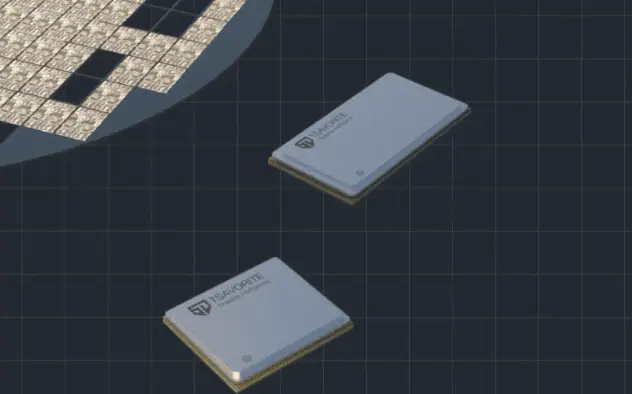Tsavorite Challenges Nvidia with $100M in Pre-Orders for Composable AI Chiplets
2 Sources
2 Sources
[1]
Tsavorite takes on Nvidia with composable AI chiplets based on Arm's Neoverse architecture - SiliconANGLE
Tsavorite takes on Nvidia with composable AI chiplets based on Arm's Neoverse architecture Semiconductor startup Tsavorite Scalable Intelligence Inc. is looking to reinvent the system-on-chip computing architecture for artificial intelligence workloads with its new Omni Processing Unit. It's a new kind of chiplet that combines a graphics processing unit with a central processing unit, memory and scale-out connectivity on a single, composable device that can be configured for everything from clusters to edge AI use cases. The startup, founded by a group of chip and software industry veterans with years of experience in building semiconductor products, says it wants to eliminate the performance and cost bottlenecks of AI infrastructure, which hinder adoption of the technology. To that end, the company has built on the concept of the SoC, a small integrated chipset that's often found in mobile devices and contains all of the required components and circuits to run a computing system. In addition to the basic GPU, CPU and memory elements, Tsavorite's OPUs feature a newly designed interconnect technology known as MulitPlexus fabric. That's compatible with everything from individual chip dies to server racks to enable rapid networking at scale. The company said it's the key technology that enables the OPU's modular architecture, allowing the system to be deployed in almost any form factor, including servers or robots, to support AI deployments at the edge, in the cloud or on-premises. In addition, the company has developed a full-stack, open-source software platform that makes it simple to port applications built with Nvidia Corp.'s CUDA, or Compute Unified Device Architecture, to run on its systems. It's called the Tsavorite Agentic Operating Stack or TAOS, and it allows for one-click application deployment without any code changes, quantization adjustments or proprietary software dependencies, the company promised. It supports numerous leading AI and application frameworks, including Kubernetes PyTorch, Ray, Triton, vLLM and HuggingFace. Tsavorite founder and Chief Executive Shalesh Thusoo said the combination of the MultiPlexus fabric and TAOS is what makes the OPU the first truly composable, developer-friendly compute platform for AI. "[It delivers] step-change gains in efficiency, cost and scale from edge to hyperscale," he said. The big selling point is scalability, Thusoo said. He explained that the unique flexibility of its MultiPlexus AI fabric allows it to connect individual chiplets with packages, systems and racks, with the potential to scale to support thousands of devices or servers. It provides ultra-low latency, distributed gigabyte caches and petabyte-scale bandwidth to create unified memory pods that can handle the most powerful of AI models with up to trillions of parameters. The OPU is not entirely the startup's own work, and a lot of its performance stems from the fact that it's based on Arm Holding Plc's Neoverse compute subsystem. That's what enables its high performance per watt and compatibility with multiple deployment environments, Thusoo explained. "By building on Arm Neoverse, Tsavorite is delivering a platform that brings together its own specialized innovation and Arm's proven high performance and energy efficiency," said Arm Vice President of Product Solutions Dermot O'Driscoll. According to Thusoo, the company is planning to start mass-manufacturing its silicon OPU chiplets and a Helix AI data center appliance by early next year, and has already secured more than $100 million worth of orders for its hardware. Its first customers include a number of Fortune 500 companies, he said, as well as leading American systems integrators and sovereign cloud infrastructure providers in the U.S., Europe and Asia. One of those early adopters is Eviden SAS, a subsidiary of the server maker Atos SE, which said it will leverage Tsavorite's OPU to enhance performance across AI training, inference and agentic workflows. Cambrian-AI Research analyst Karl Freund said Tsavorite's launch comes at a time when the semiconductor market seems to be entering a new phase of architectural innovation driven by the need to support data-intensive AI applications. "With its prototype systems already in customer evaluation and multiple design-ins, Tsavorite's chip-based architecture demonstrates real-world value and the potential to improve performance and efficiency at scale," the analyst said.
[2]
Tsavorite secures more than $100 million in pre-orders for AI chips to scale workflows
(Reuters) -AI startup Tsavorite Scalable Intelligence said on Monday it has secured more than $100 million in pre-orders from enterprises and cloud providers across United States, Asia and Europe to deploy its chips, which are used to scale AI workloads. The company has seen strong demand for its Omni Processing Unit, a compute architecture which unifies central processing units, graphics processing units, memory and connectivity in one device, enabling it to be configured to meet diverse market and application requirements. Tsavorite, founded by former Intel and chip industry veterans in 2023, expects to deliver its chips and enterprise class AI appliances, which will be capable of supporting all agentic AI workflows, by next year. The company is using Samsung's SF4X platform solution to fabricate the OPU. Tsavorite declined to disclose its current valuation or the total amount of funding it has raised so far. (Reporting by Harshita Mary Varghese in Bengaluru; Editing by Krishna Chandra Eluri)
Share
Share
Copy Link
Semiconductor startup Tsavorite Scalable Intelligence unveils its Omni Processing Unit, a composable AI chiplet based on Arm's Neoverse architecture, securing over $100 million in pre-orders from Fortune 500 companies and cloud providers across the US, Europe, and Asia.
Revolutionary Chiplet Architecture Emerges
Semiconductor startup Tsavorite Scalable Intelligence Inc. has unveiled its groundbreaking Omni Processing Unit (OPU), a composable AI chiplet designed to challenge Nvidia's dominance in artificial intelligence hardware
1
. The innovative system-on-chip combines a graphics processing unit, central processing unit, memory, and scale-out connectivity on a single, configurable device that can be deployed across diverse use cases from edge computing to hyperscale data centers.
Source: SiliconANGLE
Founded by chip and software industry veterans with extensive semiconductor experience, Tsavorite aims to eliminate the performance and cost bottlenecks that currently hinder AI technology adoption
1
. The company has built upon the traditional system-on-chip concept, commonly found in mobile devices, but enhanced it with a newly designed interconnect technology called MultiPlexus fabric.Strong Market Demand and Pre-Orders
The startup has demonstrated significant market traction, securing more than $100 million in pre-orders from enterprises and cloud providers across the United States, Asia, and Europe
2
. This substantial commitment from customers includes Fortune 500 companies, leading American systems integrators, and sovereign cloud infrastructure providers, indicating strong confidence in the technology's potential.Tsavorite CEO Shalesh Thusoo emphasized that the combination of MultiPlexus fabric and their software platform creates the first truly composable, developer-friendly compute platform for AI, delivering "step-change gains in efficiency, cost and scale from edge to hyperscale"
1
.Technical Innovation and Scalability
The OPU's architecture is built on Arm Holdings' Neoverse compute subsystem, which enables high performance per watt and compatibility with multiple deployment environments
1
. Arm Vice President Dermot O'Driscoll noted that Tsavorite's platform combines specialized innovation with Arm's proven high performance and energy efficiency.The MultiPlexus fabric technology serves as the key enabler of the OPU's modular architecture, allowing systems to be deployed in various form factors including servers and robots. This flexibility supports AI deployments at the edge, in cloud environments, and on-premises installations. The interconnect technology can scale from individual chip dies to server racks, providing ultra-low latency, distributed gigabyte caches, and petabyte-scale bandwidth to create unified memory pods capable of handling AI models with trillions of parameters.

Source: Market Screener
Related Stories
Software Compatibility and Developer Experience
Tsavorite has developed the Tsavorite Agentic Operating Stack (TAOS), a full-stack, open-source software platform that simplifies application migration from Nvidia's CUDA architecture
1
. The platform promises one-click application deployment without requiring code changes, quantization adjustments, or proprietary software dependencies. TAOS supports numerous leading AI and application frameworks, including Kubernetes, PyTorch, Ray, Triton, vLLM, and HuggingFace.Production Timeline and Manufacturing Partnership
The company plans to begin mass-manufacturing its silicon OPU chiplets and Helix AI data center appliance by early 2025
1
. Tsavorite is utilizing Samsung's SF4X platform solution for fabricating the OPU, though the company has declined to disclose its current valuation or total funding raised2
.Early adopters include Eviden SAS, a subsidiary of server maker Atos SE, which plans to leverage Tsavorite's OPU to enhance performance across AI training, inference, and agentic workflows
1
. Industry analyst Karl Freund from Cambrian-AI Research observed that Tsavorite's launch coincides with a new phase of architectural innovation in the semiconductor market, driven by the need to support data-intensive AI applications.References
Summarized by
Navi
[1]
Related Stories
Taalas raises $169 million to build custom AI chips that hardwire models into silicon
19 Feb 2026•Technology

AI Chip Startup Groq Secures $640M Funding, Valued at $2.8 Billion
05 Aug 2024

SambaNova raises $350M, partners with Intel to deploy SN50 chip claiming 5x speed over Nvidia B200
24 Feb 2026•Technology

Recent Highlights
1
Samsung unveils Galaxy S26 lineup with Privacy Display tech and expanded AI capabilities
Technology

2
Anthropic refuses Pentagon's ultimatum over AI use in mass surveillance and autonomous weapons
Policy and Regulation

3
AI models deploy nuclear weapons in 95% of war games, raising alarm over military use
Science and Research





